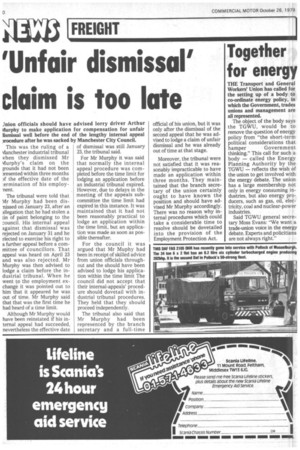'Unfair dismissal' claim is too late
Page 22

If you've noticed an error in this article please click here to report it so we can fix it.
Jnion officials should have advised lorry driver Arthur durphy to make application for compensation for unfair lismissal well before the end of the lengthy internal appeal 3rocedure after he was sacked by Manchester City Council.
This was the ruling of a vlanchester industrial tribunal when they dismissed Mr Vlurphy's claim on the ;rounds that it had not been yesented within three months A the effective date of the .ermination of his employ-nent.
The tribunal were told that Mir Murphy had been dishissed on January 23, after an allegation that he had stolen a in of paint belonging to the 2ouncil. His internal appeal against that dismissal was rejected on January 31 and he elected to exercise his right to a further appeal before a committee of councillors. That appeal was heard on April 23 and was also rejected. Mr Murphy was then advised to lodge a claim before the industrial tribunal. When he went to the employment exchange it was pointed out to him that it appeared he was out of time Mr Murphy said that that was the first time he had heard of a time limit.
Although Mr Murphy would have been reinstated if his internal appeal had succeeded, nevertheless the effective date of dismissal was still January 23, the tribunal said.
For Mr Murphy it was said that normally the internal appeal procedure was completed before the time limit for lodging an application before an industrial tribunal expired. However, due to delays in the meeting of the appeals subcommittee the time limit had expired in this instance. It was maintained that it had not been reasonably practical to lodge an application within the time limit, but an application was made as soon as possible thereafter.
For the council it was argued that Mr Muphy had been in receipt of skilled advice from union officials throughout and the should have been advised to lodge his application within the time limit The council did not accept that their internal-appeals' procedure should dovetail with industrial tribunal procedures. They held that they should proceed independently.
The tribunal also said that Mr Murphy had been represented by the branch secretary and a full-time official of his union, but it was only after the dismissal of the second appeal that he was advised to lodge a claim of unfair dismissal and he was already out of time at that stage.
Moreover, the tribunal were not satisfied that it was reasonably impracticable to have made an application within three months. They maintained that the branch secretary of the union certainly ought to have known the position and should have advised Mr Murphy accordingly. There was no reason why internal procedures which could take a considerable time to resolve should be dovetailed into the provision of the Employment Protection Act.
























































































































